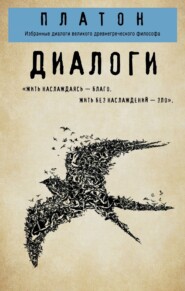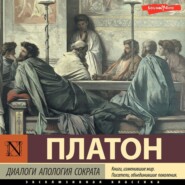По всем вопросам обращайтесь на: info@litportal.ru
(©) 2003-2024.
✖
Sophist
Настройки чтения
Размер шрифта
Высота строк
Поля
THEAETETUS: Yes.
STRANGER: And a little while ago I said that not-being is unutterable, unspeakable, indescribable: do you follow?
THEAETETUS: I do after a fashion.
STRANGER: When I introduced the word 'is,' did I not contradict what I said before?
THEAETETUS: Clearly.
STRANGER: And in using the singular verb, did I not speak of not-being as one?
THEAETETUS: Yes.
STRANGER: And when I spoke of not-being as indescribable and unspeakable and unutterable, in using each of these words in the singular, did I not refer to not-being as one?
THEAETETUS: Certainly.
STRANGER: And yet we say that, strictly speaking, it should not be defined as one or many, and should not even be called 'it,' for the use of the word 'it' would imply a form of unity.
THEAETETUS: Quite true.
STRANGER: How, then, can any one put any faith in me? For now, as always, I am unequal to the refutation of not-being. And therefore, as I was saying, do not look to me for the right way of speaking about not-being; but come, let us try the experiment with you.
THEAETETUS: What do you mean?
STRANGER: Make a noble effort, as becomes youth, and endeavour with all your might to speak of not-being in a right manner, without introducing into it either existence or unity or plurality.
THEAETETUS: It would be a strange boldness in me which would attempt the task when I see you thus discomfited.
STRANGER: Say no more of ourselves; but until we find some one or other who can speak of not-being without number, we must acknowledge that the Sophist is a clever rogue who will not be got out of his hole.
THEAETETUS: Most true.
STRANGER: And if we say to him that he professes an art of making appearances, he will grapple with us and retort our argument upon ourselves; and when we call him an image-maker he will say, 'Pray what do you mean at all by an image?' – and I should like to know, Theaetetus, how we can possibly answer the younker's question?
THEAETETUS: We shall doubtless tell him of the images which are reflected in water or in mirrors; also of sculptures, pictures, and other duplicates.
STRANGER: I see, Theaetetus, that you have never made the acquaintance of the Sophist.
THEAETETUS: Why do you think so?
STRANGER: He will make believe to have his eyes shut, or to have none.
THEAETETUS: What do you mean?
STRANGER: When you tell him of something existing in a mirror, or in sculpture, and address him as though he had eyes, he will laugh you to scorn, and will pretend that he knows nothing of mirrors and streams, or of sight at all; he will say that he is asking about an idea.
THEAETETUS: What can he mean?
STRANGER: The common notion pervading all these objects, which you speak of as many, and yet call by the single name of image, as though it were the unity under which they were all included. How will you maintain your ground against him?
THEAETETUS: How, Stranger, can I describe an image except as something fashioned in the likeness of the true?
STRANGER: And do you mean this something to be some other true thing, or what do you mean?
THEAETETUS: Certainly not another true thing, but only a resemblance.
STRANGER: And you mean by true that which really is?
THEAETETUS: Yes.
STRANGER: And the not true is that which is the opposite of the true?
THEAETETUS: Exactly.
STRANGER: A resemblance, then, is not really real, if, as you say, not true?
THEAETETUS: Nay, but it is in a certain sense.
STRANGER: You mean to say, not in a true sense?
THEAETETUS: Yes; it is in reality only an image.
STRANGER: Then what we call an image is in reality really unreal.
THEAETETUS: In what a strange complication of being and not-being we are involved!
STRANGER: Strange! I should think so. See how, by his reciprocation of opposites, the many-headed Sophist has compelled us, quite against our will, to admit the existence of not-being.
THEAETETUS: Yes, indeed, I see.
STRANGER: The difficulty is how to define his art without falling into a contradiction.
THEAETETUS: How do you mean? And where does the danger lie?
STRANGER: When we say that he deceives us with an illusion, and that his art is illusory, do we mean that our soul is led by his art to think falsely, or what do we mean?
THEAETETUS: There is nothing else to be said.
STRANGER: Again, false opinion is that form of opinion which thinks the opposite of the truth: – You would assent?
THEAETETUS: Certainly.
STRANGER: You mean to say that false opinion thinks what is not?
THEAETETUS: Of course.
STRANGER: Does false opinion think that things which are not are not, or that in a certain sense they are?

















